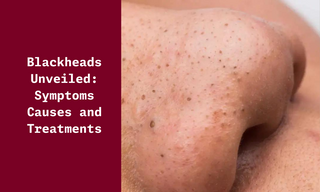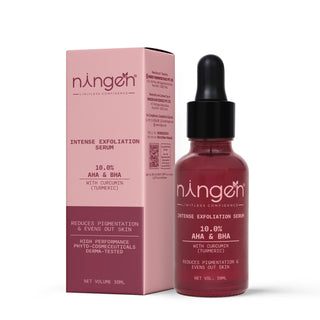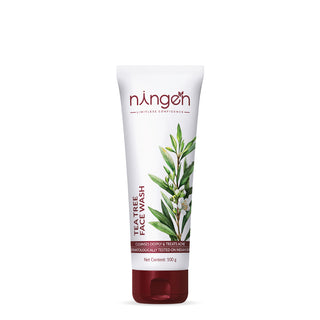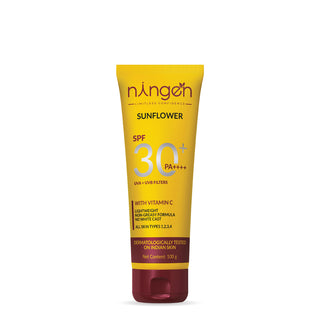Let's uncover the secrets of those pesky blackheads together!
We'll explore what they are, why they appear, and the best ways to get rid of them. Say goodbye to confusion and hello to a clearer, happier skin journey. Join us as we demystify Symptoms, Causes, and Treatments of blackheads, for clear, healthy skin.
What are blackheads?
Blackheads are tiny, dark spots that can appear on your skin. They form when hair follicles get clogged with oil, dead skin cells, and other debris. The open surface exposure causes the trapped material to oxidize, turning it black.
Blackheads appear on the skin, usually on the face, neck, chest, back, and shoulders. The build-up of bacteria, hormonal changes, and excessive oil production are the main factors that contribute to the formation of blackheads. Despite their appearance, blackheads are not caused by dirt. Regular cleansing and skincare can help prevent them.
How Are Blackheads Formed?
Blackheads form through a process called Comedogenesis, which involves the following steps:
Excessive Sebum Production: Sebaceous glands in the skin produce an oily substance called sebum. When these glands produce an excess of sebum, it can lead to an imbalance in the skin's oil production.
Accumulation of Dead Skin Cells: Skin cells naturally undergo a continuous process of renewal. As new cells form, older cells die and are shed. Sometimes, these dead skin cells do not shed properly and accumulate on the skin's surface.
Hair Follicle Blockage: Hair follicles are connected to sebaceous glands. When the opening of a hair follicle becomes clogged with a combination of excess sebum and dead skin cells, it forms a plug.
Oxidation and Discoloration: If the plugged follicle remains open, the accumulated material is exposed to air. The exposure causes oxidation, turning the trapped debris black. This oxidation process is what gives blackheads their distinctive color.
Understanding these steps helps in devising effective skincare routines to prevent or manage blackheads.
Common Causes of Blackheads
The formation of blackheads is primarily influenced by factors such as:
- Excess Sebum Production: Overproduction of sebum by the skin's sebaceous glands can contribute to the development of blackheads.
- Buildup of Dead Skin Cells: Accumulation of dead cells on the skin's surface, often due to inadequate exfoliation, can clog pores and lead to blackheads.
- Hormonal Changes: Fluctuations in hormone levels, especially during puberty, menstruation, or pregnancy, can increase sebum production and contribute to blackhead formation.
- Use of Cosmetics and Skincare Products: Certain makeup or skincare products that are comedogenic (tend to clog pores) can contribute to blackheads.
- Genetic Predisposition: Some individuals may have a genetic predisposition to produce more sebum or have a tendency to develop blackheads.
- Environmental Factors: Exposure to pollution and humid environments can also impact skin health, potentially contributing to blackhead formation.
Understanding these causes helps in adopting preventive measures and choosing suitable skincare routines to manage blackheads effectively.
Symptoms of Blackheads
Blackheads, also known as open comedones, manifest with the following symptoms:
- Small, Dark Spots: Blackheads appear as small, dark spots on the skin's surface. The dark color results from the oxidation of sebum and dead skin cells when exposed to air.
- Open Pores: Blackheads are characterized by open pores with a dark plug at the center. The pore remains open, distinguishing blackheads from whiteheads.
- Commonly on Face: Blackheads often occur on the face, particularly on the nose, forehead, and chin. However, they can also appear on the chest, back, shoulders, and arms.
- Texture Changes: The affected skin may feel rough or bumpy due to the presence of multiple blackheads in the same area.
- No Inflammation: Unlike pimples or acne cysts, blackheads typically do not cause inflammation or redness in the surrounding skin.
Recognizing these symptoms helps in the proper identification and targeted management of blackheads through appropriate skincare practices.
Treatments of Blackheads
Effective treatments for blackheads include:
- Topical Retinoids: These derivatives of vitamin A help prevent the plugging of hair follicles, promoting skin cell turnover and preventing the formation of new blackheads.
- Salicylic Acid: This beta-hydroxy acid exfoliates the skin, unclogging pores and dissolving the mixture of sebum and dead skin cells that contribute to blackheads.
- Exfoliation: Regular exfoliation with a gentle scrub or exfoliating cleanser can help remove dead skin cells, reducing the likelihood of pore blockage.
- Topical Treatments: Over-the-counter creams or gels containing benzoyl peroxide can be effective in treating blackheads by reducing bacteria and removing excess oil.
- Professional Extraction: Dermatologists may perform manual extraction of blackheads using specialized tools to avoid scarring or infection.
- Chemical Peels: A dermatologist may recommend chemical peels to exfoliate the skin and reduce the appearance of blackheads.
- Prescription Medications: In some cases, prescription-strength retinoids or oral medications may be necessary for severe or persistent blackheads.
It's crucial to adopt a consistent skincare routine, cleanse the skin regularly, and avoid squeezing or picking at blackheads to prevent further irritation or infection. Consulting with a dermatologist can help determine the most suitable treatment plan based on individual skin needs.
How to Prevent Blackheads?
To prevent blackheads, incorporate these practices into your skincare routine:
- Regular Cleansing: Cleanse your face twice a day using a gentle, oil-free cleanser to remove excess oil, dirt, and makeup.
- Exfoliation: Use a mild exfoliator once or twice a week to remove dead skin cells and prevent pores from becoming clogged.
- Non-comedogenic Products: Choose skincare and makeup products labeled as non-comedogenic, meaning they won't clog pores.
- Moisturize: Even if you have oily skin, use a lightweight, oil-free moisturizer to keep your skin hydrated without promoting excess oil production.
- Avoid Touching Your Face: Touching your face can transfer oils and dirt, potentially leading to blackheads. Resist the urge to pick or squeeze existing blackheads.
- Retinoid: Incorporate over-the-counter retinoids into your routine. These products promote skin cell turnover, preventing pores from becoming blocked.
- Salicylic Acid: Use products containing salicylic acid, a beta-hydroxy acid that helps exfoliate the skin and prevent blackheads.
- Limit Sun Exposure: Protect your skin from the sun by using a broad-spectrum sunscreen with at least SPF 30. Sun damage can lead to increased oil production.
- Healthy Diet: Consume a balanced diet rich in fruits, vegetables, and water. Limiting processed foods and sugars may help maintain skin health.
- Regular Facials: Consider professional facials or treatments that focus on extracting blackheads and maintaining skin health.
Consistency is key in preventing blackheads. Tailor your skincare routine to your skin type and concerns, and consult with a dermatologist for personalized advice and recommendations.
Discover our collection of essential skincare products designed to tackle blackhead issues. Explore our carefully selected items in the corresponding section below.
The Takeaway
Hope this article about Blackheads, their Symptoms, Causes, and Treatments helped you. Understanding and effectively dealing with blackheads involves a multifaceted approach. By recognizing the symptoms and causes, you empower yourself to make informed decisions about your skincare routine. From regular cleansing to targeted treatments like salicylic acid and retinoids, a proactive approach can significantly reduce the occurrence of blackheads.
Remember, consistency is key, and patience is your ally in the journey to clearer skin. If persistent or severe issues arise, seeking advice from a dermatologist ensures personalized guidance for your unique skin needs. Embrace a comprehensive skincare routine, make informed choices, and say goodbye to the woes of blackheads. Your radiant, healthy skin is within reach with the right knowledge and commitment to self-care.











